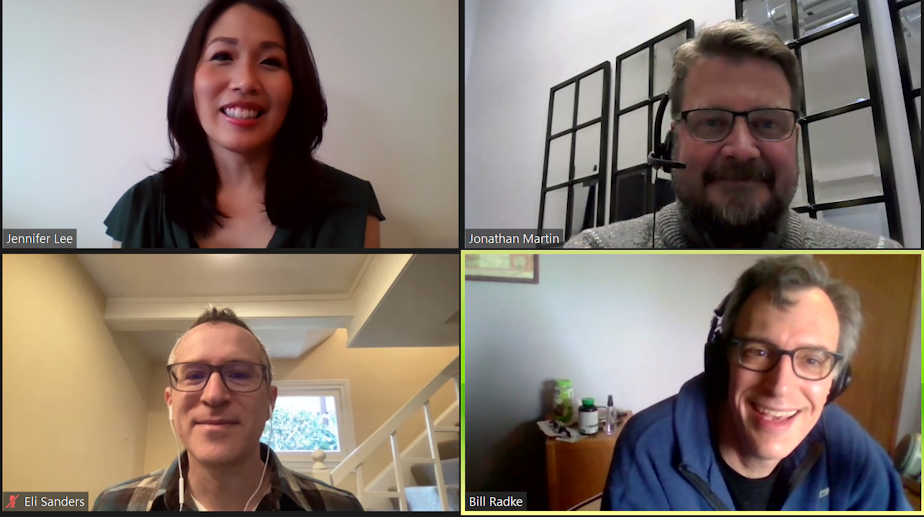Reacting to anti-Asian attacks and expanding vaccine access

Bill Radke reviews the week's news with Q13 reporter Jennifer Lee, Seattle Times investigative editor Jonathan Martin and Wild West newsletter publisher Eli Sanders.
On Tuesday, a white man shot and killed eight people in the Atlanta metro area, including six women of Asian descent. This happened days after a church in North Seattle was vandalized with anti-Asian rhetoric, and rallies were held in the Chinatown-International District condemning anti-Asian racism. Mayor Jenny Durkan and police chief Adrian Diaz released a statement that called on Seattlites to "be a cure" for the virus of racism. They also said the city would "increase outreach to the Asian American community and community-based organizations across Seattle, and supply more police patrols and more Community Service Officers." How do community members feel about this response? And would law enforcement and the media be covering the shootings in Atlanta differently if the victims weren't predominantly Asian women?
Also, on Thursday, Governor Jay Inslee announced he was extending Washington's eviction moratorium, and speeding up the timeline for vaccinations. By the end of the month people in 1B Tier 3 and 4 will be eligible for vaccination, including people over the age of 16 with 2 or more comorbidities, those living, working or volunteering in congregate settings, such as prisons, and those experiencing homelessness. But can our current vaccine supply keep up with this vaccination schedule? Plus, since no one is actually checking people’s eligibility, would you consider skipping the line?
Last June, Washington state's chief economist was warning of a recession with a budgetary shortfall of nearly $9 billion. But now the latest numbers are in and the state is projected to see a boost of more than $3 billion in tax revenue through 2023, according to the Economic Revenue and Forecast Council. Several factors are at work, from the billions the state has received in federal stimulus funds to strong business and occupancy tax collection and a hot real estate market. Still, the latest projection has kicked off a round of partisan bickering with state GOP lawmakers questioning the need for a new capital gains tax Democrats are pushing. How are federal stimulus dollars going to be put to use while major economic sectors such as restaurants continue to struggle?
And for the third year in a row the Washington Privacy Act is making its way through the state legislature. If it passes, the act would increase consumers’ rights to their personal data, and ensure businesses are transparent about collection and processing of consumer data. It would also let people opt out of having their personal data sold. Why are we on year three of trying to pass this act? On its face it sounds great, who’s against this and what’s the pushback?
Finally, a case in the Washington Supreme Court could have a major impact on Seattle’s approach to homelessness. Steven Long was living out of his truck in 2016, only to come home after work one day and discover it was missing. The city had towed it, after repeated warnings that he needed to move. A King County Superior Court judge ruled that the city had violated the state’s homestead act by impounding the truck. Because of the pandemic, Seattle currently isn’t enforcing the 72-hour parking limit that led to Long’s impoundment. What repercussions would a Supreme Court ruling in Long's favor have on Seattle and its unsheltered population, many of whom reside in vehicles?
Sponsored


